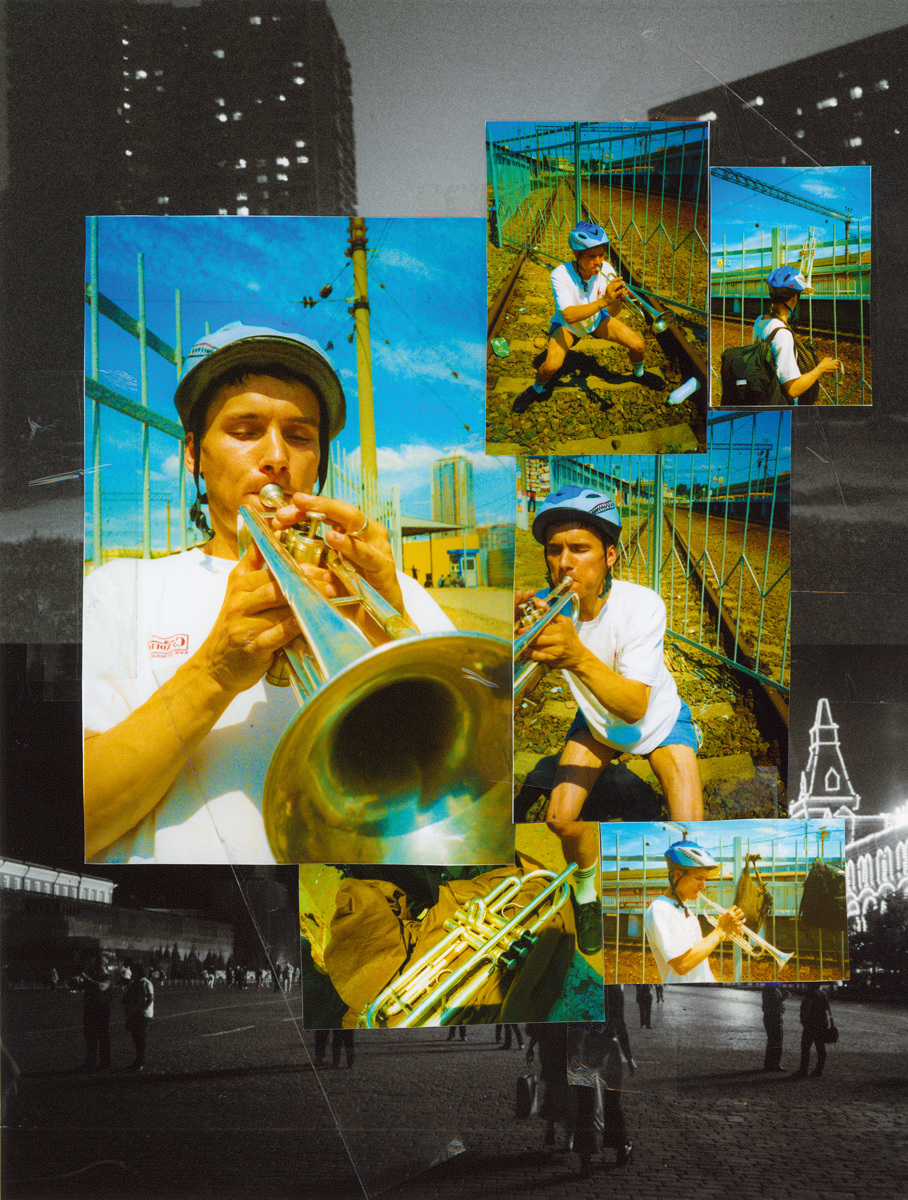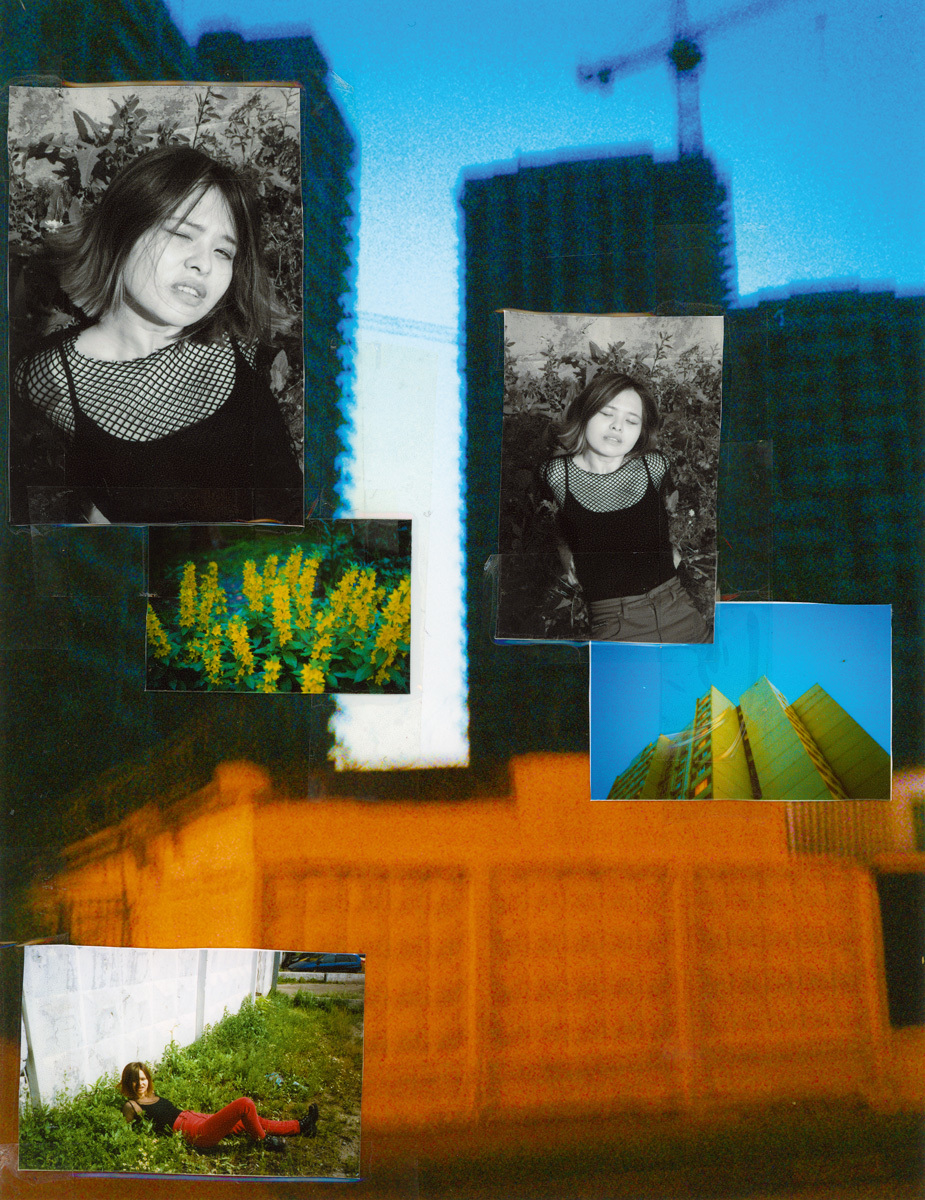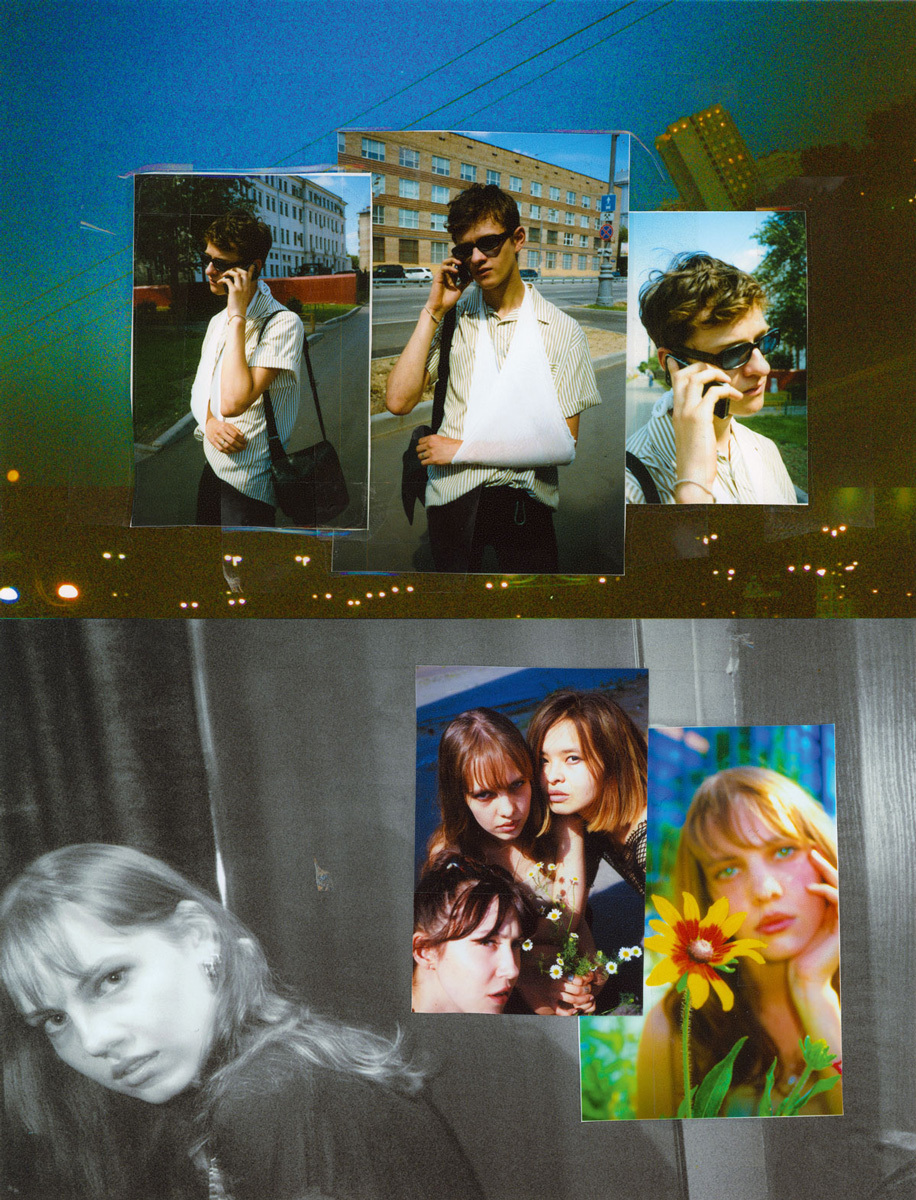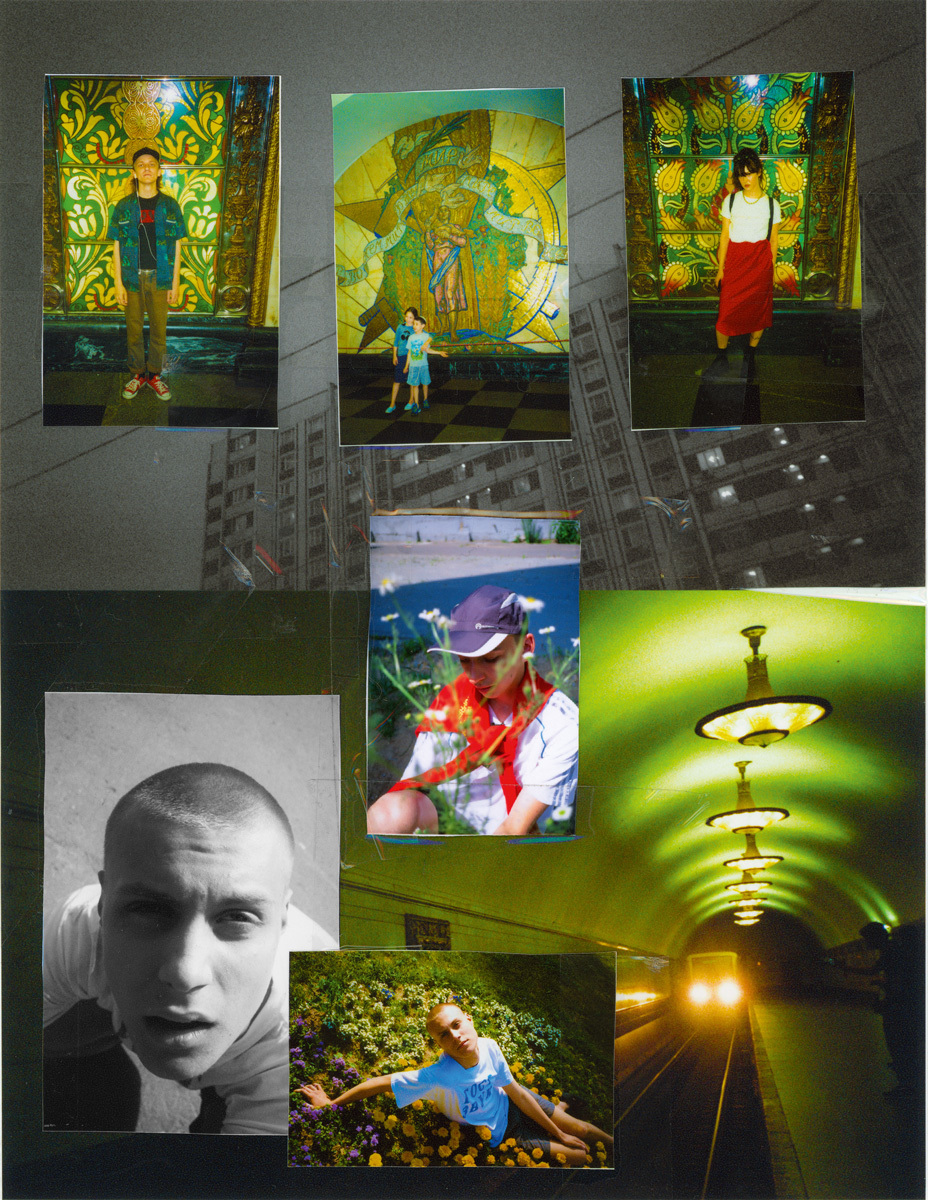Daria Pribischuk, Russki Attrackcion crew member.

Antoha MC, musician, producer and singer.

Margarita Zubatova, Russki Attrackcion crew member.

Ivan Shalakhov, designer. Bottom: Alisa Sidorova.

Top left: Yuri Katowskey, Russki Attrackcion crew member and musician. Middle: Anton Golubev, Designer. Bottom left: Artem Nanushyan, designer.
It’s the end of summer in Moscow. The city is in the midst of a major renovation, there’s scaffolding and building works on every other street. It’s been a summer of thunderstorms and it certainly feels like something’s brewing, not just under the heavy clouds, but everywhere. The city radiates new, young, fierce energy. Just round the corner from the flash facades and glowing speedways, new parties shake the unremarkable corners of Moscow, and the city’s bright young things are writing new youth manifestos.
One such is being written by creative collective, Russki Attrackcion, notorious for throwing parties in unexpected locations — merging jungle, bass and Russian punk to the joy of the new generation of Moscow’s creative youth. Russki Attrackcion was started spontaneously by Margarita Zubatova and Yuri Katowskey about a year ago. In the beginning parties were not on the agenda, the group’s main interests being fashion and music; but when they started the explosion was inevitable, and loud. In essence, however, Russki Attrackion is not just about reinventing nightlife but about the shifting identity of Russian youth.
On a cool evening in an outdoor café two steps from the Moscow river, Margarita and Yuri are in reflective mood about the future of the city they call home, and state of the country they live in. “I think Russki Attrackcion could only happen now,” Zubatova explains. “People around us started listening to Russian music, looking at references from our own history instead of copying things from the West. This weird, ugly, and strangely beautiful environment we live in suddenly became very attractive, both to Russians and to people from abroad.”
Coincidentally the cool evening is also the 25th anniversary of the failed coup attempt that heralded the demise of the Soviet Union and the starting point of contemporary Russia. 25 years in historical terms is a blink of an eye, yet for the new generation shaping the Moscow scene right now it’s more or less their whole life. This quarter of a century for them meant a transition from childhood to adulthood, while for the country itself it was a journey from the turbulent 90s through the era of bourgeoning capitalism, and into the complex political and economical situation of today. Now the new generation is curious to find out what it means to be Russian in the 21st century. “There is a great quote by Russian historian Alexander Ilyin,” Katowskey grins. “‘Russian people are happy to heavens and sad to death.’ This is how we feel about life in Russia; it’s up and down, this constantly fluctuating rhythm.”
Zubatova and Katowskey have known each other for a long time. Zubatova mainly worked in fashion, as a stylist, a buyer, and did creative direction for influential Moscow store Kuznetsky Most 20. Katowskey dedicated most of his time to music, both solo projects Drug Mo, Zhenya Bazarov, and his punk band Ekaterina. In search of new interdisciplinary kinds of narrative, they collaborated on fashion project Darkdron, which involved luring guests into an underground wartime bunker for an unsettling theatrical experience of a horror dystopia, with a disconcerting soundtrack of screams, rasping, and weird distant music.
“After Darkdron we were talking about ideas and influences and came up with the title Russki Attrakcion which described what we believed in perfectly. We started with a series of parties simply because we loved music and we had nowhere to go. Our first party took place on May 1 in a ryumochnaya in Zyuzino,” Katowskey recalls.
This ryumochnaya was a typical tattered bar serving cheap spirits to local regulars, located in a cultural wasteland of a tower block suburb in the south of Moscow. It’s a very unremarkable, very Russian place. Even three years ago, it would have been impossible to imagine forward-thinking youth partying in this setting — hip parties used to take place in the bars that took their aesthetic cues from Brooklyn or Berlin. Russki Attrakcion show that something shifted: suddenly dancing to bass music in a cheap vodka bar turned out to be fun — and felt liberating. “Ryumochnaya’s regulars were super into it as well,” Zubatova adds. “We don’t compromise with music. Moscow’s very much about techno music right now, but for us it doesn’t strike a chord, we play a weird mix of bass music, hip-hop, Brazilian beats, Russian punk, jungle — and people go crazy.”
Locations for Russki Attrakcion are always one step removed from the ordinary clubbing experience. They’ve taken place in ryumochnaya, but also mansions, pool halls, Khinkalnaya (a food joint serving huge Georgian dumplings), and lush banquet rooms with golden statues usually rented for weddings. The attitude is very inclusive and slightly guerilla. “We never rent places, we just come round, put our music on, set the light, bring our crowd,” Katowskey says. “It’s like a pop up which could appear in two hours almost anywhere.” The locations of Russki Attrakcion would talk immediately to anyone who grew up in Russia: slightly tacky, strange, and very familiar — a nostalgia for the shifting culture of the last 25 years.
“I think we started Russki Attrakcion because we felt that people are finally starting to appreciate and rethink our own culture,” Zubatova says. It was triggered by the growing self-awareness of increasingly global new generation of creatives, but also by the political isolation. “After the crisis triggered by the situation in Crimea everyone stopped going abroad as much, and was left alone with the local demons and local culture,” Katowskey explains. “People stopped being snobbish about it and started thinking, what can we do here and now? Perhaps we won’t go to Berlin — maybe we could live a fun life here.”
Contemporary Russian identity is shaped by the curious duality of inner and outer perspectives. The Western gaze, the myth of the post-Soviet youth, the rising interest in an enigmatic new east had an eye-opening effect for the new generation — but also created a desire to tell their story themselves. Although passionate about the new local movement, this generation is also in tune with a global cultural language. They’ve recently worked with the likes of Lil B, Flowdan, Terror Danjah, and have created a book for Nike. Next up is a show on New York-based online underground radio station Know Wave, showcasing Russia’s new sound to the world.
Russki Attrakcion’s Moscow is an open city of dismantled hierarchies where everyone, from the crew to random passers-by’s to working migrants are having an equal amount of fun. Part of their gang for a few days, Dexter Navy spent the day with Russki Attrakcion’s friends and collaborators, capturing the faces of the new scene amongst the landscapes of contemporary Moscow; this strange, absurd, hidden Moscow is their kingdom. It’s never been an easy city to exist in — but that makes it even more special. “We feel the rise of our own authentic youth culture”, Zubatova says. “In the circumstances of political, social, economic problems underground culture always explodes, and this is what’s happening in Moscow right now.”
Credits
Photography and Collage Dexter Navy
Creative Direction YESAWI
Production Margarita Zubatova. Photography assistance Finn Constantine.
